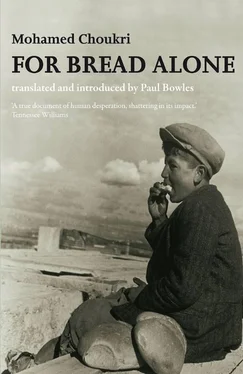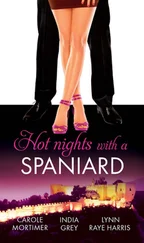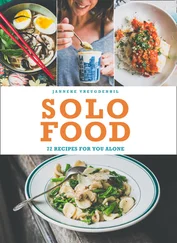We both had good appetites.
Yes, it’s sweet, I said.
Where did you pick it?
In the graveyard at Bou Araqia.
The graveyard!
Yes.
She stares at me open-mouthed.
I went to see Abdelqader’s grave. I put a little myrtle on it. The mound is not very high now. If it stays the way it is, all the dirt is going to be gone, and we won’t be able to tell it apart from the others.
She stopped eating and her features froze.
I went on: There’s lots of that rosemary there growing around the old graves.
Don’t you know you’re not supposed to eat anything that grows in a cemetery?
Why not?
She looked at me anxiously. I go on eating with relish. She is worried. Her appetite is gone. I thought for a moment that she was going to vomit. She seized the plate from which I was eating and took it away, saying in Riffian: Eat yourself up.
After a moment she asked me: Where did you get the myrtle?
Off some other graves. They had lots of it.
She stared. Tomorrow you’re going back to the cemetery and take the myrtle to the same graves where you found it. Don’t you know what graves are? And be careful nobody sees you putting the myrtle back. We’ll buy our own myrtle for your brother. We’ll make him a beautiful grave when we’ve saved a little money.
It was a great relief not to have my father in the house, but the small amount of money he had left there was soon gone. I longed to grow up quickly so I would be able to do the same sort of work he had done. In my fantasies it was taken for granted that he would never return. It was inadmissible that he should ever again have a part in the life I shared with my mother.
Sometimes she takes me with her to the Zoco de Fuera. We buy a huge pile of dry bread from the beggars. We take it home to boil in water, sometimes with a little oil and pepper, sometimes without. Early one morning she said to me: I’m going to the market to buy and sell vegetables. You stay here. Take good care of the house. Don’t go and play with the other boys and leave the door open for thieves to come in.
I began to be aware of certain differences between myself and the other boys of the neighbourhood, even though some of them were poorer than I. I had seen one of them pull chicken bones out of a garbage pail and suck them. The garbage here is good, he had said.
I hear them talking among themselves about me.
He’s a Riffian.
They’re starving to death. They’re all criminals.
He can’t even speak Arabic.
The Riffians are all sick this year.
The cows and sheep they brought with them are sick too.
We don’t eat them. They’re the ones who eat them. Rotten people eat rotten meat.
If one of their cows or sheep or goats dies, they eat it instead of throwing it out. They eat everything.
The Djibli boy, as well as the Riffian boy, is an object of this kind of scorn, but the scorn is not expressed in the same way or with the same gestures. In general the Djibli is considered an oaf. ‘The treacherous Riffian and the gullible Djibli.’ I had heard people say it.
Next to our house there is a small orchard. The big pear tree attracts me to it every day. Early one morning the owner of the orchard caught me poking a long pole into the tree and shaking the biggest and ripest pears from the branches. He drags me along the ground and I struggle to get free. At the moment I gave up hope, I felt the urine begin to run out of me into my wide Arab trousers. I was crying, even though he was not hitting me.
His wife had a bright smile.
This is the flea that’s been ruining our pear tree! he cried. He’s like a rat. He spoils more than he eats.
Where’s your mother, my son? The woman’s voice was sweet, and it soothed my fear.
She went to sell vegetables in the market, I sobbed.
Stop crying. And your father?
He’s in jail.
In jail! Poor man. Why did they put him in jail?
The question bothered me. She repeated it, caressing my cheek. Tell me. Why is your father in jail?
I felt that a truthful reply would reflect upon the family name. I don’t know why, I said. My mother knows.
A conversation followed between the man and his wife. Then their daughter appeared, barefoot, her head enveloped in a cloth, and her long fingers dripping with water. They were discussing the possibility of locking me up until my mother got back. I can see that the two women feel sorry for me. But the man, half in jest, half in earnest, wants me punished. He made me go into a dark room piled with old furniture. And don’t cry, you hear? he said as he shut the door. Or I’ll take this cane to you.
It was the first time I had been shut into a room. I realized that not only those of my own family, but other people as well, had power over me. And then I understood that the big sweet pears belonged to the people who had imprisoned me. Why did we come all the way from the Rif when others stayed behind in their own country? Why does my father go to prison, and my mother go to sell vegetables, leaving me alone and with nothing to eat, when this man stays at home with his wife? Why can’t we have what other people have?
Through a hole in the door I watched the girl as she gave the floor a vigorous scrubbing. She was still barefoot; her flimsy skirts were pulled up, revealing her thighs. As she bends over, I see her small breasts shaking back and forth. They appear and disappear inside the low-necked garment. As they tipped forward, the breasts moved like two bunches of grapes. The white cloth around her head, stained with henna, was like the outer leaves of a cabbage. I rapped on the door, softly, for I was afraid. I watched her, timing my heart to her movements. She turned towards the door, still bent over, still scrubbing. I imagined myself calling to her: Come and open this door! And I continued to call silently. Decide to come.
She dropped the rag on the floor and stood up, shaking her hands. She put her hands on her hips and bent backwards, and a faint grimace of pain flickered over her face. Here she is, coming towards the door. My heart beat faster and I began to tremble. She opened the door. What do you want? Her voice was friendly.
If my mother comes home and doesn’t find me there, she’s going to hit me, I began.
She pulled her clothing down to cover her fleshy legs. For a moment she gazed at me with compassion. I looked back at her humbly. She buttoned up the neck of her garment and stood erect. I see the two dark grapelike points of her breasts through the gauzy white cloth.
Are you going to knock the pears off our tree again with your pole?
No. You can kill me yourself if you find me doing it again.
She smiled. I did not dare to smile. She forgave me. Quickly I ran out. Behind me I heard her voice: Come here! Are you hungry?
I hesitated, torn between two desires. Then I said: No.
She understood the cause of my trembling, and insisted that I wait a moment. Her parents were not in the house. I looked at the pear tree, loving it and hating it. I was thinking that from then on I was not going to have any more of those sweet pears.
She handed me a piece of bread that dripped with honey. Here. If you’re hungry come back to our house. Haven’t you got any shoes?
No. My mother told me she was going to buy me some.
She continued to look at me, smiling at me from where she stood. Before I had run out of sight I saw her wave to me. I smiled and waved back.
Men are harder than women, I thought. I wished that the girl were my sister, and that the house and the orchard were ours. It also occurred to me that the man was not as bad as my father.
He follows us wherever we go. He whispers words into her ear, but I cannot hear what they are. She walks ahead, leaving him behind. We cross to the opposite pavement, she holding my hand. Sometimes she pulls me along roughly. I see him, still following us doggedly. He is laughing. She is angry. I am unhappy.
Читать дальше












